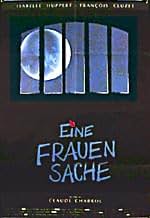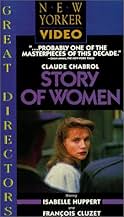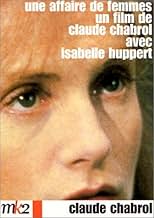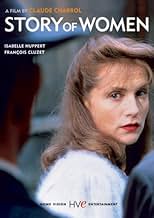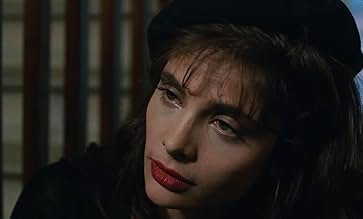AVALIAÇÃO DA IMDb
7,5/10
6,2 mil
SUA AVALIAÇÃO
Uma dona de casa, na França ocupada pelos nazistas, luta para sobreviver quando seu marido retorna para casa após ser ferido na guerra.Uma dona de casa, na França ocupada pelos nazistas, luta para sobreviver quando seu marido retorna para casa após ser ferido na guerra.Uma dona de casa, na França ocupada pelos nazistas, luta para sobreviver quando seu marido retorna para casa após ser ferido na guerra.
- Direção
- Roteiristas
- Artistas
- Prêmios
- 14 vitórias e 8 indicações no total
Avaliações em destaque
With cool detachment and a subtle touch of horror, Claude Chabrol dissects the story of a woman who was guillotined during the Nazi occupation of France. One of his strengths as a director is that he allows the movie goer to form his/her own thoughts and opinions about the issues at hand. He is not a proselytizer.
The film covers a lot of ground: illegal abortion, collaborating with the enemy, parenting, marital communication, greed and a slew of other human weaknesses. All of this against the backdrop of an occupied France, a country who witnessed the horrors of WWI and never fully recovered, and whose WWII soul (what is left of it) has been torn apart.
Isabelle Huppert does a fine job interpreting Marie LaTour, the woman in question. Marie is not the most sympathetic of characters. In fact, most of the major characters are not "sympathique".(My favorite character is the prostitute Lulu, acted by Marie Trintignant.)
All in all a well directed, well structured film about a tragic period in the lives of the French people. But you be the judge.
Trivia: "Vera Drake" and "L'Affaire de Femmes" both begin in apartments which have the the same god awful green walls.
The film covers a lot of ground: illegal abortion, collaborating with the enemy, parenting, marital communication, greed and a slew of other human weaknesses. All of this against the backdrop of an occupied France, a country who witnessed the horrors of WWI and never fully recovered, and whose WWII soul (what is left of it) has been torn apart.
Isabelle Huppert does a fine job interpreting Marie LaTour, the woman in question. Marie is not the most sympathetic of characters. In fact, most of the major characters are not "sympathique".(My favorite character is the prostitute Lulu, acted by Marie Trintignant.)
All in all a well directed, well structured film about a tragic period in the lives of the French people. But you be the judge.
Trivia: "Vera Drake" and "L'Affaire de Femmes" both begin in apartments which have the the same god awful green walls.
This earns a high rating simply for the gritty, persuasive performance from it's star, Isabelle Huppert, who is called upon to be a mother and an abortionist, to be a lover and a murderer, to be a free spirit and a prisoner of Nazi tyranny; Huppert may never gain your sympathy, and doesn't play for it, but she should gain your understanding as she plays a true-to-life story of a woman severely punished by the French government for a woman's crime that the dominant culture can not countenance because of the political atmosphere at the time--all this, and it's a gripping story,too--but not at all a cheerer-upper.
When you have finished watching this film, you may find Huppert's character hasn't quite finished with you, an observant, quiet reminder of the consequences of our actions. Hers is a haunting performance.
When you have finished watching this film, you may find Huppert's character hasn't quite finished with you, an observant, quiet reminder of the consequences of our actions. Hers is a haunting performance.
I'd like to focus on this film as a French film, not of the United States. If one has seen "La Chagrin et la Pitie," then one knows the legacy of this film. France was not perfect during WWII. Not everyone in France was part of the resistance, mainly, they were trying to survive. I think its an amazing film that sheds light on a crucial point in French history. Yes, it's about abortion and Chabrol does a great job ensuring his abortionist is less than perfect. That's a wonderful point he makes, that no one is perfect, not even the moral majority of the government. But, I come away from this film with the same questions that I get from "Lacombe, Lucien," which are: 'what would I have done?' And, please, don't Monday morning quarterback World War II.
Though I had owned this on VHS (recorded off French TV), I only opted to check it out now – after acquiring the film in a version accompanied by English subtitles, on the occasion of its director's birthday. While not a typical effort (being a period melodrama and based on fact to boot), in retrospect, it is justly considered among Chabrol's finest.
Star Isabelle Huppert (in one of her best performances, playing an essentially unsympathetic if pitiable type) received the Best Actress award at the Venice Film Festival for her work here. Interestingly, I would 'meet' Chabrol there in 2004 where the winning film that year happened to deal with the exact same subject as STORY OF WOMEN – the controversy regarding the practice of abortion, i.e. Mike Leigh's VERA DRAKE! Co-star Francois Cluzet, who acts pretty much as second-fiddle to Huppert in this case, would eventually come into his own under Chabrol's guidance in the similarly excellent L'ENFER (1994). The film, however, also provides a notable showcase for Marie Trintignant in the role of Huppert's prostitute friend; again, the actress would subsequently be promoted to lead status for the same director's BETTY (1992), which I have just watched and reviewed.
STORY OF WOMEN, then, makes for compelling viewing in several different keys: as a character study (Huppert wants to be a singer, refuses to sleep with her ex-P.O.W. husband but then takes a much younger lover, of course offers her services to girls 'in trouble' and ultimately renounces her faith while in prison), as a look at war-torn France (though the Nazis are hardly ever in the foreground, the hardships endured by the locals obviously have a lot to do with how they are 'forced' to behave) and as a critique, in the vein of Costa-Gavras' movies, of the justice system (there is no doubt Huppert was at fault but the punishment meted out, to set an example and uphold the country's moral rectitude to counter the dishonor of occupation, was too extreme). Oddly enough, once the husband exposes her to the authorities for rather selfish reasons to begin with, he basically exits the picture and is never shown feeling any kind of remorse.
For the record, Chabrol had already treated a cause célèbre in VIOLETTE NOZIERE (1978; which I will get to soon in my ongoing marathon, since I am actually approaching it in reverse chronological order!) and would do so again in the recent A GIRL CUT IN TWO (2007; that I have already viewed and commented upon).
Star Isabelle Huppert (in one of her best performances, playing an essentially unsympathetic if pitiable type) received the Best Actress award at the Venice Film Festival for her work here. Interestingly, I would 'meet' Chabrol there in 2004 where the winning film that year happened to deal with the exact same subject as STORY OF WOMEN – the controversy regarding the practice of abortion, i.e. Mike Leigh's VERA DRAKE! Co-star Francois Cluzet, who acts pretty much as second-fiddle to Huppert in this case, would eventually come into his own under Chabrol's guidance in the similarly excellent L'ENFER (1994). The film, however, also provides a notable showcase for Marie Trintignant in the role of Huppert's prostitute friend; again, the actress would subsequently be promoted to lead status for the same director's BETTY (1992), which I have just watched and reviewed.
STORY OF WOMEN, then, makes for compelling viewing in several different keys: as a character study (Huppert wants to be a singer, refuses to sleep with her ex-P.O.W. husband but then takes a much younger lover, of course offers her services to girls 'in trouble' and ultimately renounces her faith while in prison), as a look at war-torn France (though the Nazis are hardly ever in the foreground, the hardships endured by the locals obviously have a lot to do with how they are 'forced' to behave) and as a critique, in the vein of Costa-Gavras' movies, of the justice system (there is no doubt Huppert was at fault but the punishment meted out, to set an example and uphold the country's moral rectitude to counter the dishonor of occupation, was too extreme). Oddly enough, once the husband exposes her to the authorities for rather selfish reasons to begin with, he basically exits the picture and is never shown feeling any kind of remorse.
For the record, Chabrol had already treated a cause célèbre in VIOLETTE NOZIERE (1978; which I will get to soon in my ongoing marathon, since I am actually approaching it in reverse chronological order!) and would do so again in the recent A GIRL CUT IN TWO (2007; that I have already viewed and commented upon).
Definitely one of director Claude Chabrol's best films, if not his best.
It is based upon a true story out of Nazi occupied France, and stars the incredible Isabelle Huppert (The Piano Teacher, 8 Women). She is supported by Marie Trintignant (Harrison's Flowers), who had her career cut short by an untimely death.
Huppert finds a way to feed her family. She performs abortions and rents out rooms to prostitutes. Everything seems to be going well for her, but her husband is not happy about the fact that he hasn't had any in 10 years, and she now has a lover - he turns her in.
France is now rid of the Germans and is trying to restore her morality. Unfortunately, Marie to be made an example.
Huppert was great, and Trintigant was also very good.
It is based upon a true story out of Nazi occupied France, and stars the incredible Isabelle Huppert (The Piano Teacher, 8 Women). She is supported by Marie Trintignant (Harrison's Flowers), who had her career cut short by an untimely death.
Huppert finds a way to feed her family. She performs abortions and rents out rooms to prostitutes. Everything seems to be going well for her, but her husband is not happy about the fact that he hasn't had any in 10 years, and she now has a lover - he turns her in.
France is now rid of the Germans and is trying to restore her morality. Unfortunately, Marie to be made an example.
Huppert was great, and Trintigant was also very good.
Você sabia?
- CuriosidadesBased upon the true story of Marie-Louise Giraud, with character names changed.
- Trilhas sonorasLe Poème de l'Amour et de la Mer
Written by Ernest Chausson
Principais escolhas
Faça login para avaliar e ver a lista de recomendações personalizadas
- How long is Story of Women?Fornecido pela Alexa
Detalhes
- Data de lançamento
- País de origem
- Central de atendimento oficial
- Idiomas
- Também conhecido como
- Story of Women
- Locações de filme
- Coulommiers, Seine-et-Marne, França(interiors: women's prison)
- Empresas de produção
- Consulte mais créditos da empresa na IMDbPro
Bilheteria
- Faturamento bruto nos EUA e Canadá
- US$ 438.483
- Tempo de duração1 hora 48 minutos
- Mixagem de som
- Proporção
- 1.66 : 1
Contribua para esta página
Sugerir uma alteração ou adicionar conteúdo ausente

Principal brecha
By what name was Um Assunto de Mulheres (1988) officially released in India in Hindi?
Responda

